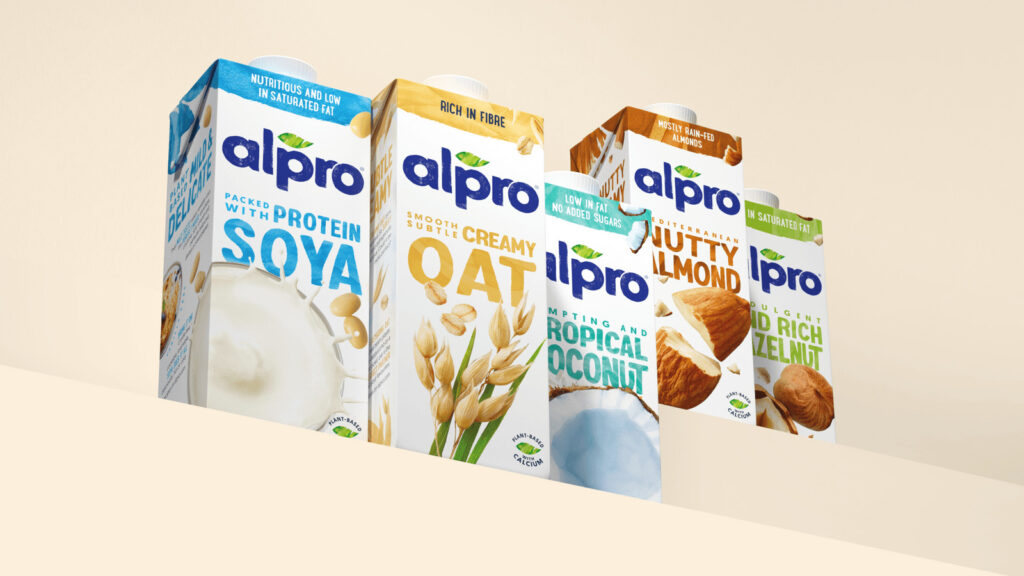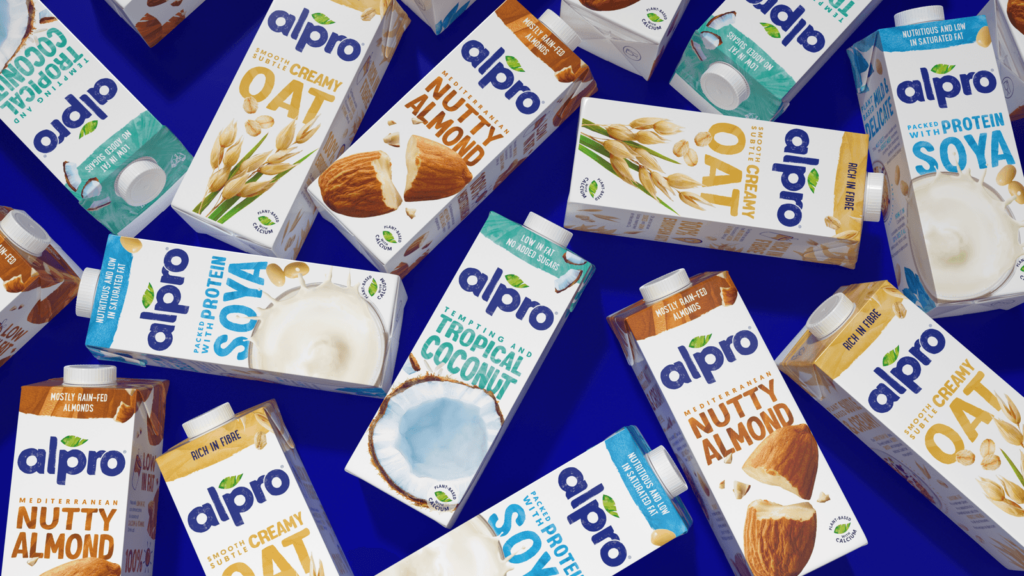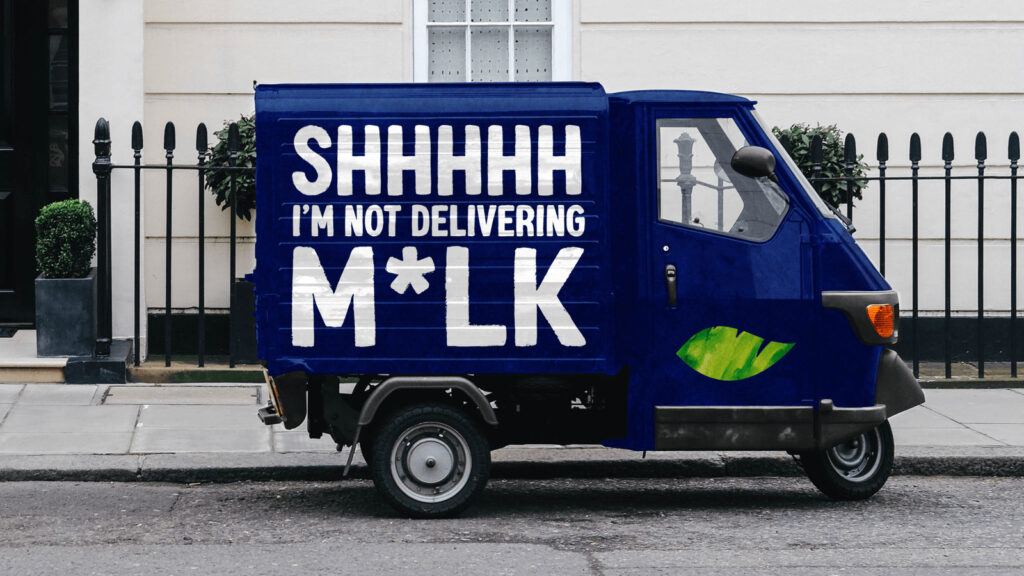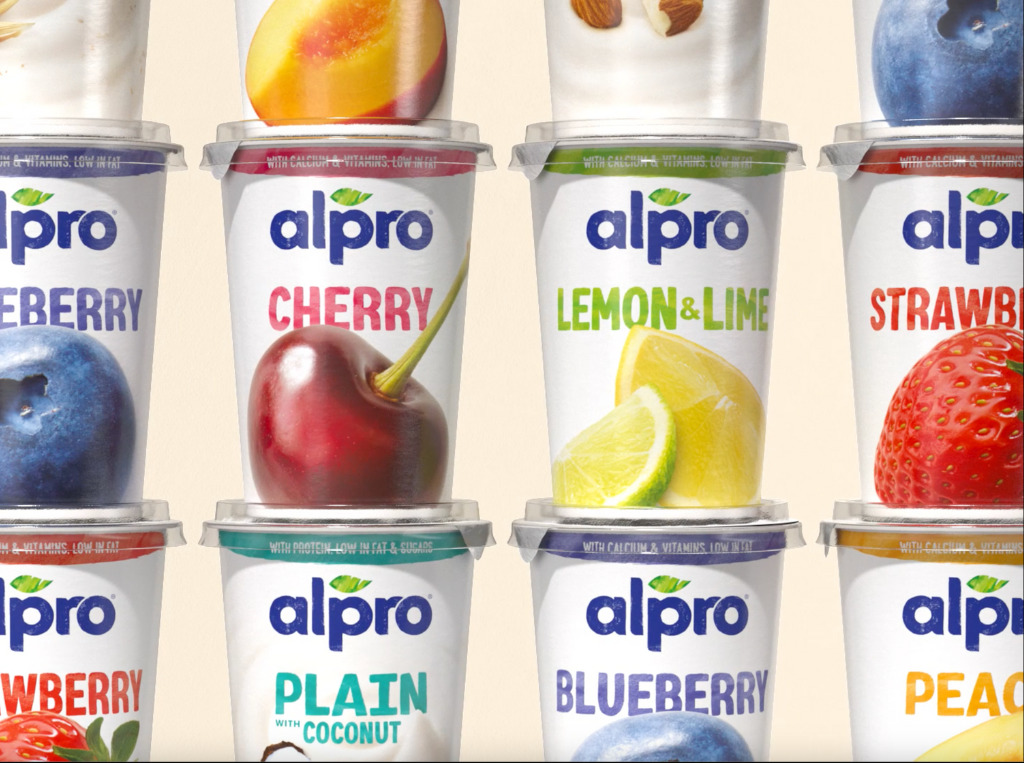‘No Longer An Alternative’: Why Plant-Based Dairy Leader Alpro Redesigned Its Packaging
6 Mins Read
Alpro’s brand refresh features new packaging putting the ingredients front and centre, along with taste descriptors and a bespoke font. Danone’s global plant-based marketing director speaks to Green Queen about emphasising sustainability over wacky marketing, why plant-based is no longer an alternative, and upgrading existing recipes.
Four years after refreshing its packaging to focus on health – with front-of-pack nutritional info and health descriptors – Alpro now wants to spotlight its ingredients. The alt-dairy giant has enlisted global design agency Elmwood – which also led its 2019 rebrand – to reinforce the power of plant-based food.
The vegan dairy category is very populated and highly competitive. Alt-milk in Europe saw a 19% rise in sales of plant-based milk between 2019-22 in Europe – double that of conventional dairy – while plant-based yoghurt saw a 16% growth. According to industry think tank the Good Food Institute Europe, plant-based milk and yoghurt – which make up the bulk of Alpro’s portfolio – are responsible for 47% of all vegan product sales in Europe, the brand’s home market.
With its new look, the Danone-owned brand hopes to consolidate its position as one of the leaders in this sector by focusing on flavour and quality. “For people who want to try plant-based a first time, the shelf today is simply intimidating,” Hedwig Borgers, Danone’s global plant-based marketing director, told Green Queen. “It is easy to get lost in the many brands shouting to be as loud and funny as possible.”
She added: “We felt the love for the natural ingredients – and the clear benefits plants offer – got a little lost. At Alpro, we believe plant-based is for everyone and want to lower the threshold by putting the power of plants at the heart of our pack, with clear reasons to believe through plants’ benefits in taste, healthy nutrition and sustainability.”
A youthful skew: the Gen Z vote

Alpro’s new packaging labels now feature a “tailored hand-cut font” developed by lettering artist Rachel Joy and typography specialists Monotype. The new design combines a lighter-hearted, informal tone of voice that feels like it’s meant to appeal to a younger demographic.
It’s a smart tactic, given that one report suggests Gen Z and millennial consumers would be almost entirely responsible for the growth of dairy and meat alternatives in 2024. But it’s not a demographic shift, stresses Borgers: “We haven’t necessarily changed our tonality as a brand; we just put it more forward on our pack as well.”
She adds “The main aim we have is to make plant-based very clear and understandable for everyone, hence we chose to clarify the benefits of our ingredients in simple words and hero them at the front. This is what we are about: superior products and what they offer to shoppers.”
Kyle Whybrow, executive creative director at Elmwood London, said the huge awareness boom gave the agency space to “move the needle” and consider “where Alpro goes next”. “The result is an evolved design that focuses on the incredible taste and smooth, moreish texture of Alpro products – from drinks to yoghurts, mousses and more,” he said.
Whybrow explained that the idea of the rebrand is to take Alpro as a recognisable and iconic brand, and “stretch the parameters of its brand story to be more bold and celebratory, ensuring it is relatable to the widest possible demographic”.
Plant-based is no longer an alternative

The new packs have taste descriptors like ‘smooth’, ‘subtle’ and ‘creamy’ for oat milk, and ‘tempting’ and ‘tropical’ for coconut milk. The background colour remains a bright white, but the colours shine through even more. Meanwhile, its vegan yoghurts are more minimalist, with the main ingredient flavour taking up the entire bottom half of the packs, complemented by the new fonts and health descriptors atop.
“By highlighting the ingredients, we bring plant-based back to its core and what it is about: the absolute beauty of plants and what they offer,” said Borgers. “For too long, plant-based has and still is being considered as an alternative to dairy, while we want to showcase how it is a unique category on its own and offers superior first-choice products.”
This is echoed by Whybrow, who said: “Along with their positive impact on health and the planet, these changes show clearly that plant-based [products] are no longer ‘just’ alternatives or supplements. They’re aspirational purchases in their own right.”
Despite the heavy feature on ingredients, health is still a big focus, with descriptors like “Rich in fibre” and “Nutritious and low in saturated fat” moved to the top of the packaging. This is a shrewd move considering 70% of Gen Zers are interested in veganism for its health benefits, instead of environmental credentials.
However, the latter is still prominent on the packaging, with the Alpro almond milk’s front-of-pack reading “Mostly rain-fed almonds”. And this is equally important for many consumers – especially in Asia-Pacific, where environmental consciousness among Gen Z and millennials is among the top sales drivers for vegan milk alternatives.
Borges outlined that sustainability is at the foundation of what Alpro does: “You will find very clear commitments of our sourcing, water use, CO2 reduction, deforestation and pack materials with the explanations and proof-points this topic deserves on the side of the pack.”
She added: “Sustainability is an ongoing commitment, and we are continuing to find even better solutions for packaging, transport and sourcing every day.”
Sustainability messaging more crucial than wacky branding

Danone’s head of plant-based design, Dominique Geeraert, said the redesign brings a “wittier, more confidence edge” to the brand’s market presence. But Borges added that in a space where every brand says it loves the planet, it’s important to outline facts rather than “just stick to punny marketing”.
For Borgers, the way to do that is to spotlight product superiority and sustainability. “We strongly believe that in the end, it’s about the product,” she explained. “We don’t want to convince people on funny or loud ads – we convince them on the product they opened their wallets for.
“Even in a time of uncertainty, people will buy the brand that commits to superior taste and nutritional and sustainability benefits. That’s where our focus has been for four decades, and we keep on being insistent on remaining the pioneers of plant-based in every product we create.”
She stressed that this is what will bring people to Alpro, and keep them. “This is also why we have put those tastes, flavours, natural ingredients and benefits so much forward on our brand restage, and why we] hero them [in] our current marketing campaigns,” she added.
Borges confirmed that Alpro plans to “double down” on its innovation pipeline, part of which means recipe developments for its core products. “We are currently renovating our key recipes to make them even better,” she revealed. “Specifically, our almond and oat products are getting a serious upgrade in 2024.”
Explaining this increased focus on product quality, she said: “This is – but you already guessed it – because we really believe bringing the best tasting plant-based is what will convince people. So most of our energy, marketing budget and innovation is devoted to making even more superior products.”



